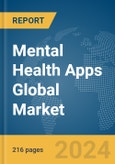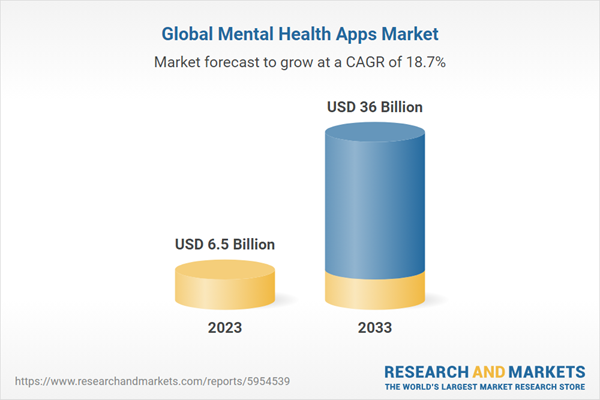The global mental health apps market reached a value of nearly $6.47 billion in 2023, having grown at a compound annual growth rate (CAGR) of 17.9% since 2018. The market is expected to grow from $ 6.47 billion in 2023 to $15.21 billion in 2028 at a rate of 18.6%. The market is then expected to grow at a CAGR of 18.8% from 2028 and reach $35.97 billion in 2033.
Growth in the historic period resulted from the growing adoption of connected devices or IOT devices, increasing internet penetration in rural and urban areas and increasing aging populations. Factors that negatively affected growth in the historic period were heightened concerns about privacy and security of personal health data and low levels of digital literacy.
Going forward, the increasing availability of smartphones and tablets, increased focus on mental health among younger generations and government initiatives to improve access to mental health services will drive the growth. Factor that could hinder the growth of the mental health apps market in the future include limited awareness and understanding of mental health issues and improper diagnosis due to incorrect information.
The mental health apps market is segmented by platform type into iOS, Android and other platform types. The iOS market was the largest segment of the mental health apps market segmented by platform type, accounting for 48.5% or $3.13 billion of the total in 2023. Going forward, the android segment is expected to be the fastest growing segment in the mental health apps market segmented by platform type, at a CAGR of 20.1% during 2023-2028.
The mental health apps market is segmented by application type into depression and anxiety management, meditation management, stress management, wellness management and other application types. The depression and anxiety management market was the largest segment of the mental health apps market segmented by application type, accounting for 29.3% or $1.89 billion of the total in 2023. Going forward, the stress management segment is expected to be the fastest growing segment in the mental health apps market segmented by application type, at a CAGR of 20.7% during 2023-2028.
North America was the largest region in the mental health apps market, accounting for 37.8% or $2.44 billion of the total in 2023. It was followed by Western Europe, Asia-Pacific and then the other regions. Going forward, the fastest-growing regions in the mental health apps market will be Asia-Pacific and North America where growth will be at CAGRs of 22.2% and 18.6% respectively. These will be followed by Western Europe and South America where the markets are expected to grow at CAGRs of 18.5% and 12.4% respectively.
The global mental health apps market is fairly fragmented, with a large number of players operating in the market. The top ten competitors in the market made up to 16.3% of the total market in 2023. Calm was the largest competitor with a 5.4% share of the market, followed by Teladoc Health Inc with 4.5%, Headspace Inc with 3.4%, Talkspace Inc with 1.1%, Insight Network Inc with 0.4%, Meru Health with 0.4%, Happify Inc with 0.3%, Meditopia with 0.3%, K Health Inc with 0.2% and Wysa Ltd with 0.2%.
The top opportunities in the mental health apps market segmented by platform type will arise in the android segment, which will gain $4.43 billion of global annual sales by 2028. The top opportunities in the mental health apps market segmented by application type will arise in the depression and anxiety management segment, which will gain $2.47 billion of global annual sales by 2028. The mental health apps market size will gain the most in the USA at $2.93 billion.
Market-trend-based strategies for the mental health apps market include development of mental health portals for employees, new product launches with focus on affordable mental health care, use of AI-powered solutions for personalized support and risk assessment for users, focus on language-based mental health apps and strategic partnerships and collaborations among market players.
Player-adopted strategies in the mental health apps market include focus on expanding its business through growing investments, focus on enhancing business capabilities through the launch of new products and focus on enhancing business operations through strategic collaborations and partnerships.
To take advantage of the opportunities, the analyst recommends the mental health apps companies to focus on employee well-being through mental health portals, focus on affordable mental health apps innovation, focus on AI-driven mental health solutions, focus on multilingual mental health apps, focus on accelerating growth in ios and android segments, expand in emerging markets, continue to focus on developed markets, focus on strategic collaborations, provide competitively priced offerings, focus on targeted promotion strategies, focus on stress management and depression & anxiety management segments, target aging populations and focus on younger generations.
Table of Contents
Executive Summary
Mental Health Apps Global Market Opportunities And Strategies To 2033 provides the strategists; marketers and senior management with the critical information they need to assess the global mental health apps market as it emerges from the COVID-19 shut down.Reasons to Purchase:
- Gain a truly global perspective with the most comprehensive report available on this market covering 15 geographies.
- Understand how the market is being affected by the coronavirus and how it is likely to emerge and grow as the impact of the virus abates.
- Create regional and country strategies on the basis of local data and analysis.
- Identify growth segments for investment.
- Outperform competitors using forecast data and the drivers and trends shaping the market.
- Understand customers based on the latest market research findings.
- Benchmark performance against key competitors.
- Utilize the relationships between key data sets for superior strategizing.
- Suitable for supporting your internal and external presentations with reliable high-quality data and analysis.
Description
Where is the largest and fastest-growing market for mental health apps? How does the market relate to the overall economy; demography and other similar markets? What forces will shape the market going forward? The mental health apps market global report answers all these questions and many more.The report covers market characteristics; size and growth; segmentation; regional and country breakdowns; competitive landscape; market shares; trends and strategies for this market. It traces the market’s history and forecasts market growth by geography. It places the market within the context of the wider mental health apps market; and compares it with other markets.
The report covers the following chapters
- Introduction and Market Characteristics: Brief introduction to the segmentations covered in the market, definitions and explanations about the segment by platform type and by application type.
- Key Trends: Highlights the major trends shaping the mental health apps market. This section also highlights likely future developments in the market.
- Macro-Economic Scenario: The report provides an analysis of the impact of the COVID-19 pandemic, impact of the Russia-Ukraine war and impact of rising inflation on the global and regional markets, providing strategic insights for businesses in the mental health apps market.
- Global Market Size and Global historic (2018-2023) and forecast (2023-2028, 2033F) market values and drivers and restraints that support and control the growth of the market in the historic and forecast periods.
- Regional Analysis: Historic (2018-2023) and forecast (2023-2028, 2033F) market values and growth and market share comparison by region and country.
- Market Segmentation: Contains the market values (2018-2023) (2023-2028, 2033F) and analysis for each segment by platform type and by application type in the market. Historic (2018-2023) and forecast (2023-2028) and (2028-2033) market values and growth and market share comparison by region market
- Regional Market Size and Growth: Regional market size (2023), historic (2018-2023) and forecast (2023-2028, 2033F) market values and growth and market share comparison of countries within the region. This report includes information on all the regions Asia-Pacific, Western Europe, Eastern Europe, North America, South America, Middle East and Africa and major countries within each region.
- Competitive Landscape: Details on the competitive landscape of the market, estimated market shares and company profiles of the leading players.
- Key Mergers and Acquisitions: Information on recent mergers and acquisitions in the market covered in the report. This section gives key financial details of mergers and acquisitions, which have shaped the market in recent years.
- Market Opportunities And Strategies - Describes market opportunities and strategies based on findings of the research, with information on growth opportunities across countries, segments and strategies to be followed in those markets..
- Conclusions And Recommendations: This section includes recommendations for mental health providers in terms of product/service offerings geographic expansion, marketing strategies and target groups next five years
- Appendix: This section includes details on the NAICS codes covered, abbreviations and currencies codes used in this report.
Markets Covered:
1) By Platform Type: IOS; Android; Other Platform Types2) By Application Type: Depression And Anxiety Management; Meditation Management; Stress Management; Wellness Management; Other Application Types.
Key Companies Mentioned: Calm; Teladoc Health, Inc.; Headspace Inc; Talkspace Inc; Insight Network, Inc.
Countries: China; Australia; India; Indonesia; Japan; South Korea; USA; Canada; Brazil; France; Germany; Italy; Spain; UK; Russia.
Regions: Asia-Pacific; Western Europe; Eastern Europe; North America; South America; Middle East; Africa
Time Series: Five years historic and ten years forecast.
Data: Ratios of market size and growth to related markets; GDP proportions; expenditure per capita; mental health apps indicators comparison.
Data Segmentation: Country and regional historic and forecast data; market share of competitors; market segments.
Sourcing and Referencing: Data and analysis throughout the report is sourced using end notes.
Companies Mentioned
- Calm
- Teladoc Health, Inc.
- Headspace Inc
- Talkspace Inc
- Insight Network, Inc.
- Meru Health
- Happify Inc
- Meditopia
- K Health Inc
- Wysa Ltd
- InnerHour
- Calm Collective
- Xingren Doctor
- Huakangtai
- Yidian Health
- Moyi Fengshui
- TESS
- Ripple Neuro
- JoyPop
- Woebot Lab
- Mindcure
- PlayBrains
- MoodMission
- Mental Health First Aid Australia
- Smiling Mind
- AloDokter
- Riliv
- Good Psychology
- Feel Good Company (FGC)
- WoopsY
- Selfapy
- HelloBetter
- Psious
- iFeel
- MindApps
- Mindler
- Serenmind
- eMindCare
- Headspace
- TherapyRoute.com
- MentalHealth
- OnlinePsicholog
- Somn.ro
- PsihoSensus
- Mindspa
- MentalUP
- PsyOnline
- Psychology.cz
- Nue Life
- Kintsugi
- Oliva
- Sööma
- Mightier
- Mantra Health
- Modern Health
- Lyra Health
- Spring Health
- Iris Telehealth
- Clarigent Health
- Happify
- Telavita
- Fala Freud
- Vitalk
- Zenklub
- Calm
- Dev Technosys
- CodeNinja
- Cisco
- Fueled
- Cognizant
- Discovery Health
- Panda Health
- MentalSnapp
Table Information
| Report Attribute | Details |
|---|---|
| No. of Pages | 216 |
| Published | April 2024 |
| Forecast Period | 2023 - 2033 |
| Estimated Market Value ( USD | $ 6.5 Billion |
| Forecasted Market Value ( USD | $ 36 Billion |
| Compound Annual Growth Rate | 18.7% |
| Regions Covered | Global |
| No. of Companies Mentioned | 73 |









